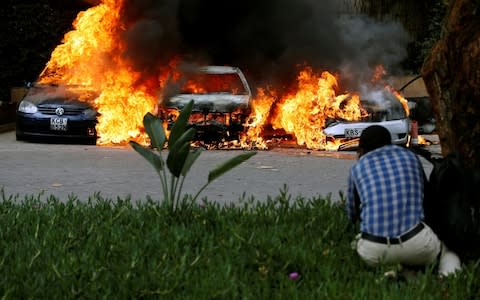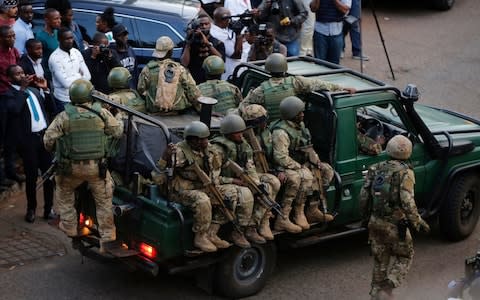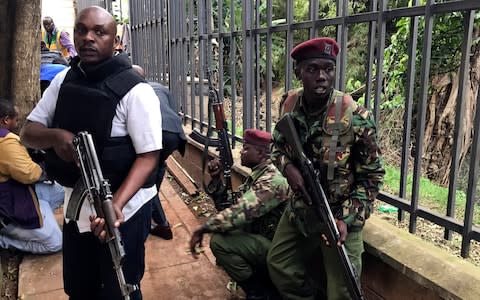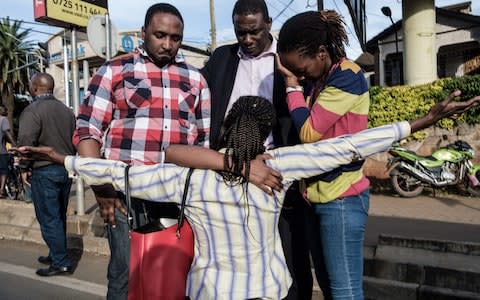Kenya attack: At least six killed in Nairobi hotel complex terror siege

Islamist terrorists detonated explosives and fired automatic weapons as they mounted a deadly attack on a hotel and business complex frequented by Westerners in Nairobi on Tuesday.
Six people have been confirmed killed in the attack, while a Kenyan police officer told reporters 15 bodies had been taken to the mortuary.
A mortuary worker added that identification papers indicated that 11 were Kenyan, one was American and one was British, while the other two did not have documents on them. Nationalities of the dead remain unconfirmed.
Hundreds more remained trapped inside buildings 16 hours after the attack began.
Local security forces freed scores of civilians as they fought their way into the grounds of 14 Riverside, a compound housing a hotel, restaurant, bars and office blocks in the city’s Westlands district.
But the reported six gunmen were still in control of parts of the five-star Dusit Hotel, part of a Thai-owned international chain that appeared to be the chief target of the attackers.
The Somali militant group al-Shabaab, which has longstanding ties to al-Qaeda, claimed credit for the attack, revisiting the city in which they killed 67 people during an attack on the Westgate shopping mall in 2013.

Just as at Westgate, barely a mile way, this was a carefully chosen target designed to bring terror to one of the prosperous parts of an increasingly prosperous city and target Westerners and rich Kenyans alike.
Several multinational firms, from America’s Colgate Palmolive to the German chemical giant BASF housed their local headquarters at 14 Riverside.
Several British firms were also based there, the consultancy groups Control Risks and Adam Smith International among them.
From the outset it was clear that this was a highly sophisticated attack.
A suicide bomber blew himself up close to the entrance as two vehicles carrying the attackers breached a security barrier, regarded as one of the most efficient in Nairobi, at the entrance to the complex.
Some of the attackers, lobbing grenades and firing automatic rifles, reportedly killed several people at the Secret Garden restaurant, a spot popular for business meetings close to the restaurant, before continuing on to the Dusit hotel.
“There was a big bang and then a lot of gunfire, up to 100 shots or more,” said Philip Coulson, a lawyer working in a nearby office block.
“Later, I saw people fleeing and others being carried out with looks of pain or anguish on their face.”
Terrified office workers in the complex’s five blocks, said to house more than 1,000 employees, hid under desks and barricaded doors.
Others, caught in the open, ran frantically for cover.
“Run, run!” one man shouted from behind a low wall as colleagues stumbled on lawns and crawled along the ground in a desperate bid for safety as shots rang out. “Down! Down!”

Kenya’s security forces earned an ignominious reputation during the Westgate attack, after army units were accused of opening fire on their police colleagues, killing the officer in charge and then embarking on a looting spree.
But this time, the initial response appeared more professional and coordinated. Army and police units, assisted by emergency crews, were quick to seal off the perimeter and rescue people from the office blocks, at least some of which appeared to be ignored by the attackers.
Many were rescued within hours, fleeing under armed guard with their hands in the air before streaming in their scores across a footbridge to the safety of a nearby university campus.
Everywhere signs of extreme emotion were visible. Shaking and often weeping, some survivors — mostly Kenyan, but some Westerners too — embraced anxious relatives waiting outside the police cordon. Others sank to the ground and gave thanks to God.

“After the first blast, after we saw the restaurant had been blown up, we ran and hid under tables,” said Elizabeth Maina, an employee at AC Nielsen, an American global research firm housed in the Belgravia building close to the entrance.
“There was shooting everywhere. We called and sent messages to the police. After an hour, we saw men in uniforms and plain clothes enter the room. They shouted ‘police, police’ and led us out.”
Workers in office blocks, with plenty of hiding places and lockable doors, were always more likely to survive.
Those in the hotel, whose foyer opens out onto a restaurant, bar and swimming pool, would have had much less of a chance — as their attackers surely knew.
Just how high the death toll could be is unlikely to become clear until the attack is over, although witnesses said they saw at least five bodies and reported body parts strewn on the ground outside the hotel.
“There was no time to count the dead but it is true that there are people who have died,” said one police officer involved in the operation.

Kenya has long been in al-Shabaab’s sights, even before it sent troops across the border into Somalia in 2011 in an attempt to root out the militants behind the abductions of Western tourists on the Kenyan coast, Britons among them.
In 1998, an al Qaeda attack, which involved a number of Somalis, on the American embassy in Nairobi killed more than 200 people. The number of attacks soared after 2011.
Westgate aside, 147 students were killed in an attack on a university in the northern town in Garissa in 2015 while scores more had previously died when suspected al Shabaab militants struck at villages on the northern Kenyan coast.
Improved intelligence, aided by tactical and training support from Britain, has seen a halt to large-scale attacks since 2015, although often deadly ambushes on Kenyan forces near the Somali border remain frequent.
Despite mounting domestic opposition and al-Shabaab attacks on their bases, Kenyan forces remain in Somalia.
The attack on 14 Riverside came on the third anniversary of an al-Shabaab attack on a Kenyan military base in the Somali town of El Adde. Kenya has refused to release details of the death toll, but analysts say they believe more than 140 Kenyan soldiers were killed.

